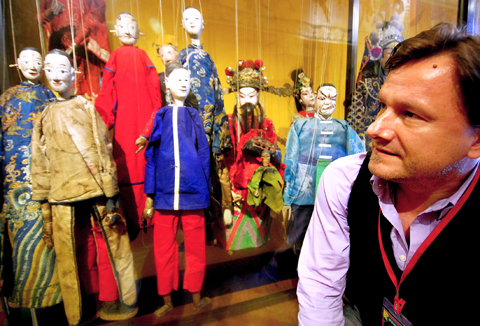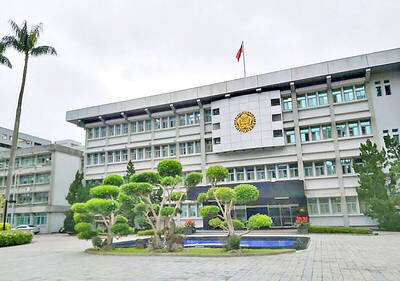Taipei-based Dutch puppet master Robin Ruizendaal draws his inspiration from Taiwanese folklore and Western fairy tales in his bid to promote the traditional art of glove puppetry.
In so doing, Ruizendaal, director of a leading Taiwanese puppet museum and its troupe of theatrical puppeteers, has created a repertoire that has caught the fancy of local and international audiences alike.
His multinational troupe features Taiwanese puppet master Chen Xi-huang (陳錫煌), son of legendary puppeteer Li Tien-lu (李天祿), Chen’s protege, Massimo Godoli Peli of Italy, and a crew of narrators, light and stage designers, and a puppet maker.

PHOTO: SAM YEH, AFP
The team has traveled as far as Russia and Central America to stage Taiwanese puppet theater in some 30 countries and has collaborated with peers in Asia and Europe.
“People are always surprised to see that the leader of a Taiwanese puppet troupe is a Westerner,” said Ruizendaal, who also serves as the lead script writer. “I think this shows that Taiwan is more internationalized and more open-minded toward outsiders.”
Ruizendaal came to the nation 15 years ago to help plan a puppetry festival after gaining his Ph.D in Sinology on Chinese marionette theater from the University of Leiden in the Netherlands.
As part of his studies he did research in China’s Fujian Province, where glove puppetry was popular in the 19th century. While there are no records to show just when glove puppetry originated, some academics believe it dates back to the Song Dynasty (960-1279) when various forms of puppetry were prevalent.
Also known as budaixi (布袋戲), it later spread to Taiwan as people migrated from China and was performed mainly at religious festivals.
Puppeteers maneuver glove dolls on ornate wooden stages to present historical and martial arts stories, often with stunts such as somersaults or plate-juggling.
After working as a curator at a paper museum for a while, Ruizendaal joined the TTT Puppet Center — now renamed the Lin Liu-hsin Puppet Theater Museum after its founder, Paul Lin’s father.
The four-story museum, located in Taipei’s Dadaocheng (大稻埕) district, where puppet troupes once thrived, boasts a collection of some 7,000 puppetry artifacts from across Asia.
“There is a large puppetry audience in Taiwan where television puppet drama is popular,” Ruizendaal said.
“But it is still a big challenge to get people to buy tickets and go see puppetry at theaters,” he said.
There are an estimated 300 puppet troupes in Taiwan mostly performing at religious fairs, while only 10 groups are doing theatrical puppetry, Ruizendaal said.
To broaden the appeal of theatrical puppetry, Ruizendaal has fused traditional Taiwanese puppetry with Western story telling and theatrical effects to create an original repertoire.
“I draw inspiration from my upbringing and from the sinology and Chinese culture I have studied,” he said.
One brainchild is Marco Polo, a love story inspired by the Italian explorer famous for his travels to imperial China. It is staged with dialogue in Taiwanese and Italian against a background of classical Chinese music and Italian opera.
“We want to keep the spirit of classic puppetry alive with some modern effects. We hope to produce refined theatrical puppetry even if we have to call everyone to sell a ticket,” Ruizendaal said.
But he admitted it was difficult to promote works with a traditional theme such as The Honorable Thief Liao Tian-ding about a Taiwanese folk hero performed on a vintage wooden stage.
Ruizendaal also lamented that Taiwan, not unlike other Asian countries heavily influenced by Western pop culture, was facing a lack of interest among young people in traditional puppetry.
“There are people coming from France and Spain to study Taiwanese puppetry at our museum, but local youth think it’s more sexy to become film makers, video artists or disc jockeys,” he said. “It seems crazy to them to study the obsolete puppetry. There is a crisis to pass on the craft if nobody wants to learn it.”
Ruizendaal hopes the puppet museum can attract new blood by offering free puppeteer apprenticeships.

The German city of Hamburg on Oct. 14 named a bridge “Kaohsiung-Brucke” after the Taiwanese city of Kaohsiung. The footbridge, formerly known as F566, is to the east of the Speicherstadt, the world’s largest warehouse district, and connects the Dar-es-Salaam-Platz to the Brooktorpromenade near the Port of Hamburg on the Elbe River. Timo Fischer, a Free Democratic Party member of the Hamburg-Mitte District Assembly, in May last year proposed the name change with support from members of the Social Democratic Party and the Christian Democratic Union. Kaohsiung and Hamburg in 1999 inked a sister city agreement, but despite more than a quarter-century of

The Ministry of Foreign Affairs (MOFA) yesterday expressed “grave concerns” after Singaporean Prime Minister Lawrence Wong (黃循財) reiterated the city-state’s opposition to “Taiwanese independence” during a meeting with Chinese Premier Li Qiang (李強). In Singapore on Saturday, Wong and Li discussed cross-strait developments, the Singaporean Ministry of Foreign Affairs said in a statement. “Prime Minister Wong reiterated that Singapore has a clear and consistent ‘one China’ policy and is opposed to Taiwan independence,” it said. MOFA responded that it is an objective fact and a common understanding shared by many that the Republic of China (ROC) is an independent, sovereign nation, with world-leading

Temperatures in northern Taiwan are forecast to reach as high as 30°C today, as an ongoing northeasterly seasonal wind system weakens, the Central Weather Administration (CWA) said. CWA forecaster Tseng Chao-cheng (曾昭誠) said yesterday that with the seasonal wind system weakening, warmer easterly winds would boost the temperature today. Daytime temperatures in northern Taiwan and Yilan County are expected to range from 28°C to 30°C today, up about 3°C from yesterday, Tseng said. According to the CWA, temperature highs in central and southern Taiwan could stay stable. However, the weather is expected to turn cooler starting tonight as the northeasterly wind system strengthens again

The Ministry of Justice Investigation Bureau (MJIB) has been investigating nine shell companies working with Prince Holding Group, and the Taipei District Prosecutors’ Office is seeking further prosecution of alleged criminals, a source said yesterday. The nine companies and three Taiwanese nationals were named by the US Department of the Treasury’s Office of Foreign Assets Control (OFAC) on Oct. 14 as Specially Designated Nationals as a result of a US federal court indictment. Prince Holding founder Chen Zhi (陳志) has been charged with fraud, conspiracy, money laundering and overseeing Prince Holding’s suspected forced-labor camps in Cambodia, the indictment says. Intelligence shared between Taiwan,